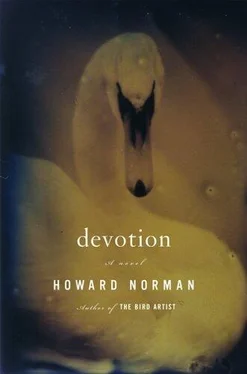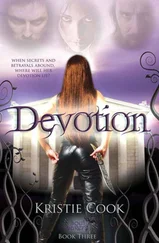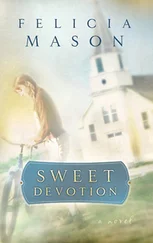When they reached the pond, Maggie pointed at the swans; two were on the water, the rest on the far bank, sleeping, preening, the usual repertoire. William removed the loafer from his left foot, dipped his toes in, testing the water. He said something to Maggie. She carefully waded in. David could hear her laughter through the screen door. Submerged up to her waist, she stretched out across the surface and performed a few sidestrokes, drifted, stroked out to the middle and back. David took photographs all along from the porch. Maggie got out of the water. David photographed their picnic, a few swans paddling close for handouts, receiving none.
William walked back to the main house. David went into his kitchen. Replacing the telephoto lens with a shorter one, David photographed Maggie as she walked past half an hour later. She combed her fingers through her hair, twisted the ends, ringing out pond water. When she was directly in front of the kitchen window, she stopped. Maggie allowed David to chronicle her braiding her hair into two pigtails, and then, without once meeting his eyes, she continued on.
This tableau — David behind a window, Maggie just outside — constituted part of the same choreography of punishment and encouragement that defined each of Maggie’s visits over the next few weeks, and raised in William’s mind questions about what inventive stupidities people were capable of when wounded and confused, no matter their native intelligence. No matter their love for each other.
He’d come to some new knowledge about his daughter, always a useful thing, he knew. He thought about her situation most often at night while listening to opera. On the one hand, he admired her having built such a forbidding moat around herself. Why should she let David easily cross it? They had not even had time to set up house, and then that London hotel room. Dunce. On the other hand, William worried that her visits — this directive, et cetera — had a recklessness about them. That Maggie’s appearances and exhibitions, these opportunities for David to begin their family album under house arrest, contained a taunting vindictiveness he previously had no idea was part of his daughter’s nature, and whether justified or not, such displays might erode the situation beyond repair. Though nothing could be concluded with certainty, he figured that obsessing like this partly defined being a father, in that he was obliged to think these thoughts but could not — except when asked, and even then he’d expect his opinions to be ignored — give advice to Maggie. Besides, what could he do about any of this? He tried not to lose sleep over it. But a person doesn’t get to choose what to lose sleep over.
When Maggie disappeared into the house, David went straight to the darkroom, spending hours developing the photographs. To his great relief they all were in focus. He hung the prints on a clothesline in the bathroom to dry, and later fitted each one in the album William had purchased in Parrsboro. Under each photograph, along with the date, he provided a simple caption: “Maggie opening a picnic basket,” “Maggie looking at swans,” “Maggie asleep on a blanket,” and so on. The captions served no purpose other than to describe the obvious. As for the photographs themselves, they qualified more as snapshots than anything. In this respect, they defied all influence of Josef Sudek, but were hardly original. Too bad: clichés often have some ring of truth; these were scenes he embraced. David’s photographs were constructions of memory, the album meant to preserve them, and he considered it a decent beginning.
Late Sunday morning, after taking photographs of Maggie walking to her car as she left for Halifax, David didn’t submit to any pain medication and drove the truck into Parrsboro for an early lunch at Minas Bakery. He’d telephoned William first, asking to use the truck, and William’s reply was “It’s low on gas, you’ll notice.”
The bakery was empty of customers. Dory Elliot was washing the pastry window, which she once referred to as “the best view in Parrsboro.” The window was full of lemon tarts, baked that morning. She got to the bakery at 4 A.M., as everyone knew.
“How’s life so far this morning?” she said to David when he sat down at a table.
“Coffee, please, Dory. And a tuna sandwich — and I know it’s a bit early for lunch, but I was up early.”
“You look like you were up all night.”
“And a glass of water, please.” Dory put a cup of coffee and a glass of water on the table, then set about preparing the sandwich. “Dory, I don’t think I’m up to answering your ‘How’s life?’ question. Sorry.”
“Well, your face no longer resembles a Halloween mask. That’s optimistic.”
David noticed a paperback face-down on the counter. “What are you reading there?”
“Mr. Earl Stanley Gardner. A Perry Mason mystery. The Case of the Dubious Bridegroom. He wrote hundreds, and I’ve read dozens to date.”
“I remember the American TV program.”
“Nothing like the books,” Dory said. “The TV show, I watched it religiously. But it was always the same. They got to the trial as soon as possible, and then, five minutes before the end, some man or woman — and sometimes you hadn’t even seen this person before! — they’d stand up in the courtroom and cry out, ‘I did it!’ And Perry would turn those big dark owl eyes on that person and get an expression on his face, and there was only one possible way to interpret his expression: ‘I knew it was you all along!’ But like I said, I watched it religiously. And what do I mean by that? I mean had Perry Mason been broadcast on Sunday mornings, I would have chosen it over church.”
“Since I’ve known you,” David said, “you’ve always chosen not going to church, without any TV show conflicting.”
“That’s true too. But also I have my bakery open Sunday mornings. In case you hadn’t noticed. I provide for people after church. I’ve been told more than once it’s appreciated.”
Dory lived over the bakery. She once said to David, “I’m the only one in Parrsboro travels vertically to work.” He watched her make the sandwich, then looked out the window. The old-fashioned crank-down green-and-white-striped awning cast a shadow on the sidewalk. Dory brought over the sandwich, went back behind the counter. After taking a few bites, David noticed Dory staring at him. “What is it, Dory?” he said.
“Would you please tell me how William’s doing?”
“Sit down with me a minute.”
Dory stepped around the counter and sat across from David. “Thanks for the invitation,” she said.
“William is much improved,” David said. “Last doctor’s report was excellent. He’s singing along with his opera records.”
“Dead opera singers turning in their graves, I imagine.”
“My father-in-law doesn’t have much of a voice. But considering that after the accident he wasn’t much more than a bullfrog with laryngitis—”
“What a thing, that accident. What a thing.”
“I won’t ask you, Dory, what you know of all that. Let’s just say I’m aware Naomi Bloor stops into the bakery on a regular basis.”
“Did you conjoin with that Czechoslovak woman or not?”
“God, you are a direct person, aren’t you?”
“Yes or no?”
“Yes, before Maggie and I were married. No, after.”
Dory reached over and took a sip of David’s coffee. “Before is before. After would’ve been entirely different, eh?”
“Dory—”
“Sandwich bad?”
“No, it’s fine. Dory — William told me. About you and him.”
“When?”
“When I was in the hospital. We were looking at Field family photograph albums. There were photographs of you in them. One subject led to another. I was getting morphine.”
Читать дальше












